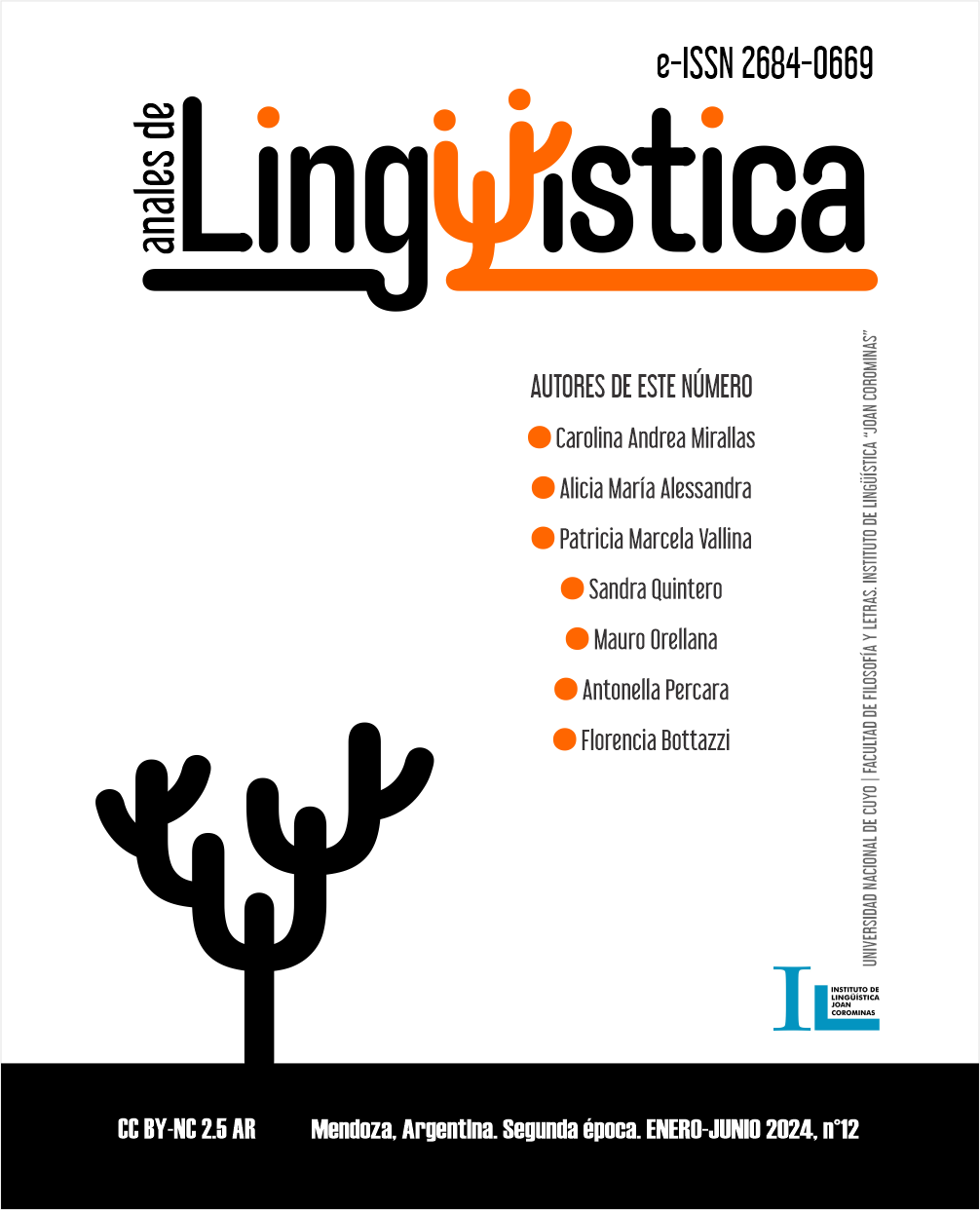La Combinatoria léxica de verbos de decir como comportamiento
Palabras clave:
lexicografía, diccionario pedagógico, Español como Lengua Extranjera, combinatoria léxica, verbos de decir, comportamiento, propiedades semánticas, colocativosResumen
El presente trabajo se enmarca en un proyecto lexicográfico que se propone recoger la combinatoria léxica de sustantivos, verbos y adjetivos para la compilación de un diccionario de colocaciones destinado a aprendientes de Español como Lengua Extranjera (ELE). Este trabajo en particular tiene por objetivo recolectar la combinatoria léxica de las unidades que conforman un subdominio de verbos de decir como comportamiento, a saber, charlar, conversar, hablar, debatir, discutir, describir, lamentarse, quejarse, mentir, así como de los sustantivos correspondientes derivados por nominalización. El marco teórico combina el modelo de Transitividad de la Lingüística Sistémico Funcional (LSF), según este se presenta en Matthiessen (1995), Halliday y Matthiessen (2014) y, para el español, Lavid et al. 2010, con distintas líneas de investigación en el área de estudio de las colocaciones (Alonso Ramos, 2010; Koike, 2001 entre otros). En este artículo se ejemplifica, mediante un grupo más acotado de verbos y sustantivos dentro del dominio estudiado, la metodología para recolectar la combinatoria a partir de los corpus aprovechados (CORPES XXI, de la Real Academia Española, y el Corpus del Español de Mark Davies), así como los esquemas de recolección empleados y las categorías de colocaciones en dichos esquemas. Se presentan las colocaciones registradas para verbos y sustantivos correspondientes derivados por nominalización agrupadas por proximidad semántica. Se comentan además los resultados de un análisis comparativo de esta combinatoria para establecer atributos semánticos comunes a los colocativos registrados. Este estudio procura hacer una modesta contribución tanto al modelo de Transitividad de la LSF como al área de estudio de las colocaciones.
Citas
Alonso Ramos, M., Nishikawa, A. y Vincze, O. (2010). DiCE in the web: An online Spanish collocation dictionary. En: Granger, S. y M. Paquot (eds.) e-Lexicograpy in the 21st century: New Challenges, New Applications. Proceedings of eLex 2009, Cahiers du Cental 7. (pp. 367-368). La-Neuve: Presses universitaires de Louvain.
Halliday, M. and Matthiessen, C. (2014). An Introduction to Functional Grammar. (4th ed.) Routledge.
Higueras García, M. (2004). La enseñanza aprendizaje de las colocaciones en el desarrollo de la competencia léxica en el español como lengua extranjera. Universidad Complutense de Madrid. Tesis doctoral inédita.
Koike, K. (2001). Colocaciones léxicas en el español actual: estudio formal y léxico-semántico. Universidad de Alcalá.
Lavid, J., Arús, J. y Zamorano-Mansilla, J. (2010). Systemic Functional Grammar of Spanish. A Contrastive Study with English. Continuum.
Magariños, V. y Hlavacka, L. (2019). Diccionario pedagógico de combinatoria léxica de español: propuesta de investigación, metodología y avances. En: Perassi, L. y Kwiecien, M. Palabras como puentes. Estudios lexicológicos, lexicográficos y terminológicos del Cono Sur. Buena Vista Editores.
Martin, J. y White, P. (2005). Evaluation in Text. Appraisal in English. Palgrave.
Matthiessen, C. (1995) Lexicogrammatical Cartography. International Language Sciences Publishers.
Descargas
Publicado
Cómo citar
Número
Sección
Licencia
Derechos de autor 2024 Sandra Quintero
Esta obra está bajo una Licencia Creative Commons Atribución 2.5 Argentina.
Los/as autores/as que publican en esta revista están de acuerdo con los siguientes términos:
1. Los/as autores conservan los derechos de autor y garantizan a la revista el derecho de ser la primera publicación del trabajo bajo una licecncia Creative Commons Atribución 2.5 Argentina (CC BY 2.5 AR) . Por esto pueden compartir el trabajo con la referencia explícita de la publicación original en esta revista.
2. Anales de lingüística permite y anima a los autores a difundir la publicación realizada electrónicamente, a través de su enlace y/o de la versión postprint del archivo descargado de forma independiente.
3. Usted es libre de:
Compartir — copiar y redistribuir el material en cualquier medio o formato
Adaptar — remezclar, transformar y construir a partir del material para cualquier propósito, incluso comercialmente.























